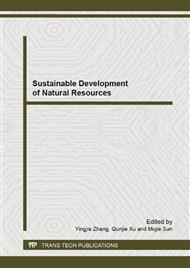[1]
Information on http://www.edcmep.org.cn/hjxw/2000.html
Google Scholar
[2]
Liu, Shaokang. in Chinese: Introduction of Environmental Protection. Qinghua University Press. (2002)
Google Scholar
[3]
Dunlap, Riley E. and Jones, Robert E. "Environmental Concern: Conceptual and Measurement Issues." Handbook of Environmental Sociology. Edited by Dunlap, Riley E. and Michelson, William. Westport, CT: Greenwood Press. (2002)
Google Scholar
[4]
Hannigan, John A. Environmental Sociology: A Social Construction Perspective. London: Routledge. (1995)
Google Scholar
[5]
Information from The Sixth National Population Census Data Bulletin, Nanjing (2011)
Google Scholar
[6]
L. Zhu and R. Chen, in Chinese: New migrants in City--Research Report of Nanjing, Nanjing University Press. (2004)
Google Scholar
[7]
B. Cao, in Chinese: Migration and Social Harmony Symposium, Jiangsu Federation of Philosophy and Social Science (2011)
Google Scholar
[8]
R. Carson, in: Silent Spring, Boston (1962)
Google Scholar
[9]
F. Osborn, in: Our Plundered Planet, Boston (1948)
Google Scholar
[10]
G.T. Gardner and P.C. Stern, in: Environmental Problems and Human Behavior (2nd ed.), Pearson Custom Publishing, Boston (2002)
Google Scholar
[11]
R.E. Dunlap and R.E. Jones, in: Environmental concern: conceptual and measurement issues. edited by R. E. Dunlap, & W. Michelson, Handbook of environmental sociology. Westport, CT: Greenwood Press. (2002)
Google Scholar
[12]
N. Fransson and T. Garling, Fransson, N. and T. Gärling. Environmental concern: Conceptual definitions, measurement methods, and research findings. Journal of Environmental Psychology 19, (1999), pp.369-382.
DOI: 10.1006/jevp.1999.0141
Google Scholar
[13]
R.E. Dunlap and R.E. Jones, in: Environmental attitudes and values. edtied by R. Ferna´ ndez-Ballesteros, Encyclopedia of psychological assessment. London: Sage. (2003).
Google Scholar
[14]
R.E. Dunlap and K.D. Van Liere, Journal of Environmental Education Vol. 9 (1978), pp.10-19
Google Scholar
[15]
M.P. Maloney and M.P. Ward, American Psychologist Vol. 28 (1973), pp.583-586
Google Scholar
[16]
R. Weigel and J. Weigel, Environment and Behavior Vol. 10 (1978) , pp.3-15
Google Scholar
[17]
P.C. Stern, T. Dietz and G.A. Guagnano, Environment and Behavior Vol. 27 (1995), pp.723-743
Google Scholar
[18]
L.C. Zelezny, P.-P. Chua and C. Aldrich, Journal of Social Issues Vol. 56 (2000), pp.443-457
Google Scholar
[19]
M. Cordano, S.A. Welcomer and R.F. Scherer, The Journal of Environmental Education Vol.34 (2003), pp.22-28
Google Scholar
[20]
L.M. Hunter and L. Rinner, Society and Natural Resources Vol.17 (2004), pp.517-532
Google Scholar
[21]
D.-Y. Hong and C.-Y. Xiao, Society Vol.5 (2006) , pp.71-91
Google Scholar
[22]
Arcury, T. A., Scollay, S., & Johnson, T. P. Sex differences in environmental concern and knowledge. Sex Roles, 16 (1987), P.463–472.
DOI: 10.1007/bf00292481
Google Scholar
[23]
Hayes, B. C. Gender, scientific knowledge, and attitudes toward the environment. Political Research Quarterly, 54 (2001), p.657–671.
DOI: 10.1177/106591290105400309
Google Scholar
[24]
Baxter, R. Gender differences in attitudes toward nuclear power: A multivariate explanation. Unpublished doctoral dissertation, Washington State University, Pullman. (1988)
Google Scholar
[25]
Dunlap, R. & Van Liere, K. D. Commitment to the dominant social paradigm and concern for environmental quality, Social Science Quarterly, 65 (1984), pp.1013-28.
Google Scholar
[26]
Carton, Adam D., Environmental Worldview and Faith in Science as Moderators of the Relationship between Beliefs about and Attitudes toward Nuclear Energy Psychology Theses. (2010), p.73.
Google Scholar
[27]
World Health Organization, WHO meeting on the assessment of quality of life in health care. Geneva: WHO (MNH/PSF/91.4), (1991)
Google Scholar


